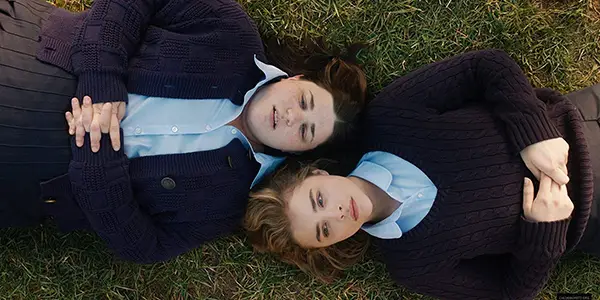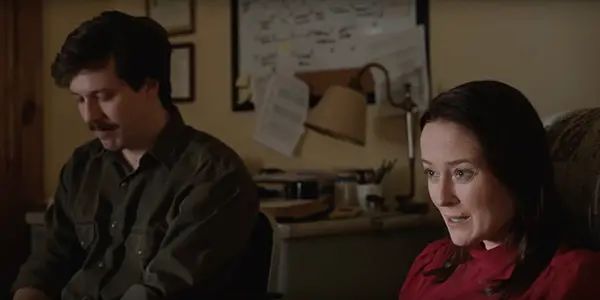THE MISEDUCATION OF CAMERON POST: Moretz Is Top Of The Class In Affecting Drama

Rainbow colours fill the streets and thousands march in unity and love around the world as each year Gay Pride marches grow in attendance. Rupaul’s Drag Race becomes a pop culture smash and spawns a host of iconic queens and phrases into the mainstream. In 2014, Laverne Cox becomes the first openly transgender person to be nominated for an Emmy Award for her role in Orange Is the New Black. And in 2015, Florida’s ban on same sex marriage becomes no more and many couples finally headed to the altar.
It’s heartening and fair to say that we have come a long way baby in terms of attitudes and prejudices towards the LBGT+ community and each year more milestones are reached. So, it may be hard for the younger generations of today to imagine that being gay was once a crime and that in America up until the 1970s, it was classified as a mental disorder. It may also be hard to swallow that as recent as the 1990s, American parents who feared for their teenage children’s emerging homosexuality subjected them to gay conversion therapy in the hope of a ‘cure’.
It is a subject that has caught the eye of cinema with Joel Edgerton’s Boy Erased, about the son of a preacher forced into a church supported gay conversion program due to hit screens later in the year. But first out of the blocks comes director Desiree Akhavan’s adaptation of Emily M. Danforth’s novel The Miseducation of Cameron Post.
Teenage Crush(ed)
The film begins in 1993 with teenager Cameron Post (Chloë Grace Moretz) traversing adolescence and stealing kisses with her friend Coley (Quinn Shephard). As her makeup is done for her prom, she immediately removes the lipstick in the mirror, uncertain of the image she is supposed to portray to the world, and poses awkwardly for photos with her male date that she has little interest in.
Whilst at the prom, Cameron and Coley steal themselves away to the back of a car, unable to resist the intimacy they crave, but they are discovered by Cameron’s date and she is outed and shamed. Cameron’s guardian Ruth (Kerry Butler) swiftly packs her off to conversion camp ‘God’s Promise’ in the hope that Cameron can ‘pray away the gay.’ The teenager finds herself in a shared room where she must earn decorating privileges and where her Breeders cassette is confiscated.

Overseeing the camp is Dr. Marsh (Jennifer Ehle), who has the (misguided) determined belief that she can banish the devil of homosexual thought with the righteous love of Christ, that it is merely temptations that can be vanquished from the soul. She is aided by her brother Reverend Rick (John Gallagher Jr.); he is the relatable guy with the guitar at the camp, who has his own success story of how he was ‘saved’ in a gay bar by his local church parishioners. As Cameron struggles with her enforced surroundings and her internal feelings, she finds a form of emotional reprieve with two fellow residents Adam Red Eagle (Forrest Goodluck) and the fantastically named Jane Fonda (Sasha Lane).
Independent Spirit
Director Desiree Akhavan charmed with her first feature Appropriate Behaviour (2014) about a young Persian bisexual woman struggling to maintain the ideals that her culture expects and dealing with the recent breakup with her girlfriend. The film balanced humour and heart and marked Akhavan as an exciting modern voice in cinema and the perfect fit for the source material of The Miseducation of Cameron Post.

Her adaptation does provide moments of humour – Cameron’s roommate works out to a tape called Blessercise, a montage involving the campmates identifying their underlying issues for their same sex attractions – yet this never feels like simply getting cheap laughs. Instead, these moments pepper the narrative to provide slight relief from a film that is ultimately a sad and heartbreaking tale and a confident, mature second feature from Akhavan. Her direction holds a tender gaze of sorrow as we witness the campmates being emotionally stifled, their personalities being muted, unable to express themselves for who they are. She captures the uncertainty of adolescence beautifully: that being a teenager is hard enough, confused by the rush of hormones and feeling like you don’t belong in your own body, without someone telling you that what you are feeling is wrong and that you need to be cured.
Akhavan also infuses a great deal of compassion into the film, with each character given space and shade and no one is painted as a clear villain, even the camp leaders are not demonised for their values. In one scene, after a devastating incident involving a young male camp member who tries to control his urges to seek acceptance from his father, Reverend Mike breaks down in front of Cameron. He confesses that he doesn’t know what he is doing, his faith is shaken by the realisation of the enormity of the consequences their work has created.
Chloë full of Grace
The Miseducation of Cameron Post is a film where every performance is raw yet assured, all the cast bringing something to their characters to make them fully realised, but the heart of the film rests upon the shoulders of its titular protagonist. After bursting onto our screens in a purple haze as Hit Girl in Kick Ass (2010) Chloë Grace Moretz has struggled to find a role to rival her breakout role and to show her emotional range.
But as Cameron, she puts in her most mature and nuanced performance to date. She is a figure of subtle aching, of feelings of longing and not knowing where she belongs. She spends the majority of the film closed and quiet, her fellow campmates regarding that she doesn’t open up and that she isn’t trying. But it is perhaps because Cameron is still trying to work out who is she and what she wants, the answer isn’t revealed to the audience because she is still in a period of uncertainty as any teenager would be and should be allowed the privilege of.
There are two moments in the film where Cameron breaks out and breaks down, the first is when she is on kitchen duty with Adam and Jane, as the ubiquitous ’90s Four None Blondes song comes on the radio. She begins singing along with her friends and then finds the spirit in her to stand on the kitchen table and sing louder. It is a moment of simple joy, but as Cameron begins to find her voice, she is cut short by Dr. Marsh and she reverts back to the insular character.

The second is when she makes a call to home and cannot hide her emotion anymore. She breaks down into tears to her guardian Ruth, and it is a shattering scene that highlights how this young girl is being torn and treated at a pivotal time in her life. Moretz’s portrayal will make you rethink what you thought about her as an actress, and her performance will stay with you as will the film. No definitive answers are reached or concluded with Cameron Post. Like in life, uncertainty remains as we travel from adolescence to adulthood, and no matter who tries to steer that path and influence our lives, it is something that we must ultimately figure out by ourselves and pray we gave it our best shot.
Conclusion: The Miseducation Of Cameron Post
Sadly, there are fragments of the world that still hold the overly fevered Christian values that same sex relationships are a sin, and so The Miseducation of Cameron Post hits on a topic that is contemporary and significant but it never handles this in a way that feels, for want of a better word, preachy. It is a film about teenagers but not what you would expect a teenage film to be; instead it gives heart and a voice to those who are subjected to opinions and values that threaten to affect their future. We have come a long way but we still need to fight, so that the idea of trying to cure same sex attraction feels to everyone like a relic of our troubled history. In the face of those who try to control our sexuality we must scream from the top our lungs: ‘what’s going on?’
What do you think of the subject of Conversion Therapy and how this is to be portrayed in films? Will you watch The Miseducation of Cameron Post?
The Miseducation of Cameron Post is released on 3rd August 2018 in America and on 7th September 2018 in the UK.
Does content like this matter to you?
Become a Member and support film journalism. Unlock access to all of Film Inquiry`s great articles. Join a community of like-minded readers who are passionate about cinema - get access to our private members Network, give back to independent filmmakers, and more.











